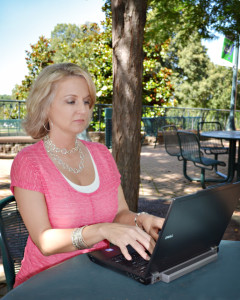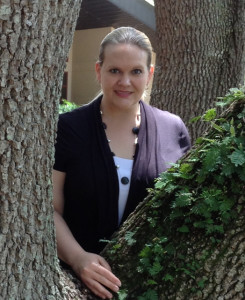By Christy Case Keirn

Melissa Brooks Klinger enrolled in college at 30 after a divorce left her without an income, a home, or much hope. With two children to care for and just a few courses in typing and word processing under her belt, the single mother took just one course at a time and started creating the life she wanted for her children. It took 10 years, but Melissa earned the Associate of Arts degree she had set her sights on. After reaching that milestone, her dreams began to come true.
“I got married when I was young, and earned my GED,” says Melissa, “but when I started over at 30, I knew an education was the only way I could change my life for my children. I could have survived, but I wanted my kids to have more opportunity.”
The route Melissa took after earning her Associate’s degree at Arkansas State University-Mountain Home is one that is gaining popularity, particularly for women. Melissa enrolled in an online program and wound up with both her bachelor’s and master’s degrees in three years.
“We are seeing an increase in inquiries from women about both online offerings and the accelerated degree programs at ASUMH,” says Sandie Melton, academic resource specialist and online coordinator at ASUMH. According to institutional data, 68.7% of students in online classes at ASUMH are female, compared to 31.3% male. “Most women in our area have to work. They also have children and households to manage. Finding time to come to campus 15 hours each week is nearly impossible for many of these women. Online education gives them the opportunity to study with their children, model good study skills, and attach real value to time spent in learning.”
Melissa agrees. “I had to work full time, so online classes were exactly what I needed.”

She took her laptop with her everywhere she went for the three years she worked on her bachelor’s and master’s degrees. “I could cook a good supper for my kids, bathe them, throw a load of laundry in, and then log in and do coursework. It gave me an opportunity to have a balanced and manageable life.”
Getting an advanced degree online gave Melissa an opportunity to move into a better paying job, too. While working on her associate’s degree one course at a time, she worked as an office manager at an investment firm, and in the insurance industry as a licensed agent, over a 10-year time period. While taking the last course before she graduated with her AA, she started working at ASUMH as an assistant to the vice chancellor of administrative affairs. That position involved responsibilities in Human Resources, which Melissa loved, and that experience inspired her to seek her Bachelor of Science in Human Resources Management. She earned her bachelor’s online in just 18 months, and coupled with her experience, she met the qualifications for the job of director of Human Resources at ASUMH when there was an opening. Less than two years later, she was holding a master’s degree as well.
Increasingly, people are choosing online programs. In 2011, there were approximately 21 million college students and about 6.7 million (32%) of them were taking at least one online course. That same year, almost 3 million students were enrolled in fully online programs (Eduventures, 2012).
Women who are looking for a chance to make a difference in their lives are turning more and more to online programs. “Female students are very serious,” Sandie says. “They expect immediate feedback and they get it in their online courses. They work on their courses whenever they can, which might be in the middle of the night or on their lunch hours.”
In online associate or bachelor’s programs, 55.1% of students claim one or more dependents, according to the National Center for Education Statistics. Whether they are developing skills for an eventual return to the job market, continuing their own personal development, or setting a good example about the value of education to their children, the convenience and flexibility of online education means moms can pursue a degree without having to make special child-care arrangements, Sandie says.
Melissa’s children have seen the effort and time she has invested in getting her degrees online, and it has impacted them positively. “My daughter, who is nine, already talks about going to college someday! She has seen the value of a college education and how important it is, and wants it to be a part of her future.”

Terri Lynn Ashchi is currently in online classes at ASUMH and agrees that they are the only way she could accomplish her goals. “I chose online classes because I am a mother and I work part time. Online classes enable me to work on my schoolwork when I can. I save time and money by not having to commute to and from school or pay for child-care expenses. Since my husband travels frequently, I do most of my schoolwork at night after 8 p.m. when my daughters go to bed,” Terri Lynn says. “I feel like my returning to college has had a positive impact on my daughters as well. My 12-year-old and I compare grades over dinner. I feel like I’m a role model in my children’s lives, and their outlook on getting a college education has changed. It has also changed our family dynamics. I feel much love and support from my family and their willingness to see me succeed. As a mother, I was putting my own desires and goals on the back burner in order to accommodate my family and put them first. I have learned, however, that my decision to pursue my degree has resulted in inspiring my family to attain their goals as well.”
Both Melissa and Terri Lynn encourage women to take the leap and meet any hesitations head on. “Women shouldn’t be afraid of college,” Terri Lynn says. “Any woman who is a working mother has what it takes to go to college!”
“Getting into college was the first stepping stone for me,” Melissa says. “Women need to know that it can be the first stepping stone for them too, to wherever they want to go and whatever they want their lives to be.”
Terri Lynn says she even enjoys college more today. “The classes make more sense and seem more meaningful to me than when I was younger. College Algebra was always a terror barrier for me before. I decided to take it as my first course and gave it all I had. I passed Algebra with a B, but that class proved to be more than a just a grade for me. It proved that I had broken my terror barrier and I felt invincible and knew I could take on whatever was to come in order to reach my goal.”
Online learning has a few challenges, but the positive aspects often outweigh them. Compare the costs of several schools and weigh all your options before you make a final decision. Consider an accelerated program of study, which can be intense, but means a degree can be earned in as little as 13 months. The first step toward finding the money for returning to school is to fill out the Free Application for Federal Student Aid at www.fafsa.ed.gov. By filling out the FAFSA, you will be notified of any student aid you are eligible for. Never pay for assistance in filling out the FAFSA. It is a simple form that takes just a few minutes if you have your tax forms handy. Scholarships are also plentiful. Melissa found a national scholarship that she qualified for after a quick Google search, and it took care of a large portion of the costs associated with getting her Bachelor’s degree.
There is a great deal of discussion and writing required when you take classes online and, while you don’t have to be a technological wizard, you do have to know the basics of using a computer and have high-speed Internet service. Some programs have basic requirements for high-speed Internet access that isn’t available in all rural areas. Online courses are often packed into a shorter timeframe, which means you must keep up while on vacation or during holidays.
“It isn’t easier, nor is it more difficult than classroom learning,” Terri Lynn says about online classes. “I love the fact that I determine my own schedule and all I have to worry about is turning in my assignments by the deadlines. It takes commitment to study just as you would in a classroom setting, except I get to go to class in my pajamas!”
Advice for Online Students

Sandie Melton, academic resources specialist for ASUMH, suggests these tips for making the most of the online experience:
• Be sure you have the technology needed — a computer and high-speed Internet access are essential.
• Time management is the most important skill you will need.
• Be sure the school you choose is a regionally accredited institution.
• Log in and check your email and announcements every day.
• Be sure to ask questions. It is your responsibility to be a proactive learner.
• Expect to work harder and pay more for an online degree.
M! August/September 2013

Leave a Reply